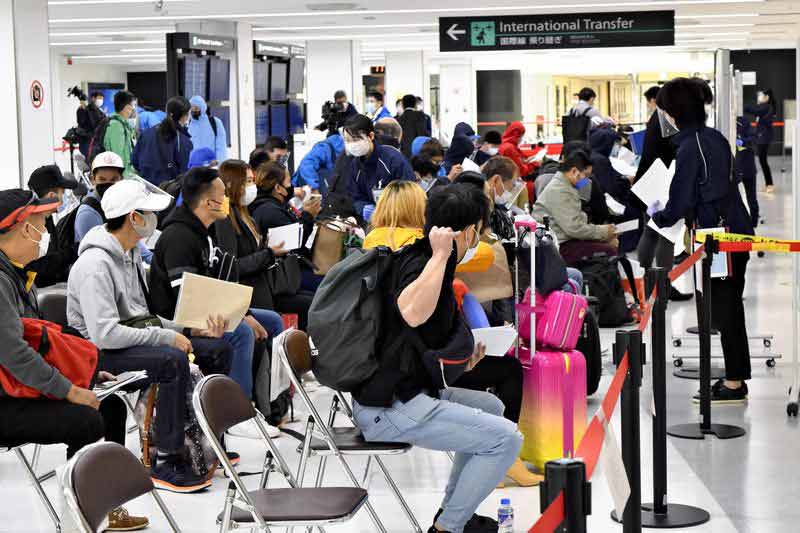
People wait for results of PCR test at Narita Airport in Chiba Prefecture on Tuesday.
December 1, 2021
Foreign residents from 10 countries in southern Africa will not be allowed to reenter Japan from Thursday as part of measures against the omicron coronavirus variant.
Foreign visitors are currently banned from entering Japan, but reentry had been permitted for foreign residents.
The government has decided to ban, in principle, the reentry of foreign residents from Angola, Botswana, Eswatini, Lesotho, Malawi, Mozambique, Namibia, South Africa, Zambia and Zimbabwe.
All people arriving from these 10 countries have been required to quarantine at government-designated facilities for 10 days upon reentry, a measure implemented after the discovery of the omicron variant.
The government decided that further restrictions were necessary following confirmation Tuesday of the first domestic case of the omicron variant in a Namibian diplomat who had recently entered Japan from Namibia.
A 10-day quarantine period will continue to be in place for Japanese nationals returning from the 10 countries.
The government will add on Thursday Nigeria, Portugal, Spain and Sweden to the countries and regions on its omicron watchlist. Travelers arriving from countries on the watchlist are required to complete a three-day quarantine at a government-designated facility.
According to the government, the Namibian diplomat tested positive for coronavirus at Narita Airport when he arrived in Japan on Sunday.
The man, who is in his 30s, was fully vaccinated with the Moderna Inc. vaccine.
Following a genome analysis, the National Institute of Infectious Diseases confirmed Wednesday that he was infected with the omicron variant.
No positive cases were confirmed among the other 70 people on the flight.
As a precaution, the government has asked them to self-isolate for 14 days and has said it would publicize their names if they do not cooperate with measures such as taking virus tests every other day.
Restrictions on the entry of foreign visitors have been in place since January this year.
Exceptions have been made for the spouses and children of Japanese nationals; foreigners with permanent resident status; diplomats and people with special qualifications; and visitors whose trips are for humanitarian or “public interest” purposes.
Determining what constitutes “public interest” has been left up to relevant ministries and agencies. According to the government, it can include performances by overseas musicians, but the status has been criticized as being too vague.
With omicron cases being confirmed in various countries around the world, the government is stepping up its border control measures.
The Health, Labor and Welfare Ministry has asked prefectures and other organizations to ensure that genome analysis is carried out promptly for those who test positive within 14 days of entering Japan, regardless of the country from which they traveled.
The rollout of PCR tests that can detect the omicron variant is also being planned.
Top Articles in Society
-

Man Infected with Measles Reportedly Dined at Restaurant in Tokyo Station
-

Man Infected with Measles May Have Come in Contact with Many People in Tokyo, Went to Store, Restaurant Around When Symptoms Emerged
-

Woman with Measles Visited Hospital in Tokyo Multiple Times Before Being Diagnosed with Disease
-

Australian Woman Dies After Mishap on Ski Lift in Nagano Prefecture
-

Foreign Snowboarder in Serious Condition After Hanging in Midair from Chairlift in Nagano Prefecture
JN ACCESS RANKING
-

Japan PM Takaichi’s Cabinet Resigns en Masse
-

Japan Institute to Use Domestic Commercial Optical Lattice Clock to Set Japan Standard Time
-

Israeli Ambassador to Japan Speaks about Japan’s Role in the Reconstruction of Gaza
-

Man Infected with Measles Reportedly Dined at Restaurant in Tokyo Station
-

Videos Plagiarized, Reposted with False Subtitles Claiming ‘Ryukyu Belongs to China’; Anti-China False Information Also Posted in Japan





















